Professor explores humanitarian medicine and values
Doctors Without Borders faces ethical challenges in global community
Professor Farrelly-Jackson speaks to a overcrowded room on Jan. 27 about the global health community and ethics as part of the Karl W. Weiss ’87 Lecture Series.
The fifth lecture in the Karl W. Weiss ’87 Faculty Lecture Series filled the campus center room 301/302 to capacity on Jan. 27. Speaker Steven Farrelly-Jackson, associate professor of philosophy, said the full room was a surprise. By 6:50 p.m., the seats were filled and it was standing room only for the lecture entitled, “Humanitarian Medicine and Ethics: Reflections on Médecins Sans Frontières.”
The topic of this lecture comes after Farrelly-Jackson took a sabbatical in the spring of 2015 to study ethics surrounding the global health community in Europe. Farelly-Jackson came back with a wealth of knowledge and the goal of creating a new course after speaking with representatives from the World Health Organization, the International Committee of the Red Cross, the United Nations Educational, Scientific and Cultural Organization, Oxfam, Médecins Sans Frontières, also known as Doctors Without Borders, and many others.
“I wanted to examine the ethical framework within which [Doctors Without Borders] operates and which—in a sense—sets its own values. But then examine some of the challenges which the organization faces and, in particular, to [examine] some challenges which seem to go against those core values [of Doctors Without Borders],” Farrelly-Jackson said.
Farrelly-Jackson interviewed three people from Doctors Without Borders, two from Swiss Operations in Geneva, Switzerland, and one from the French Operations Center in Paris, France.
“I had these interviews with people and much of my talk was based off what I head in the interviews and also what people shared with me in terms of [Doctors Without Borders] materials. The challenges I engaged were challenges determined by [Doctors Without Borders] itself,” Farrelly-Jackson said.
Farrelly-Jackson approached the preparation for this lecture differently than he would for one of his classes because he knew the audience would be mixed as far as students, faculty and staff. He was not prepared for the large showing from the community outside of Allegheny, namely from Wesbury Retirement Community.
Farrelly-Jackson’s lecture was scheduled to end at 8 p.m. but lasted until 8:45 p.m. in part due to the massive amount of discussion among the audience that was spurred by film clips shown during the lecture.
“For a couple of those [film clips], I actually—in a sense—paused and invited some immediate discussion about what they had just seen on the film,” Farrelly-Jackson said. “I did that partly because the films were quite affecting, they were very immediate, they were showing these very difficult situations between patients and doctors or even between doctors and other local community members and I wanted to get a sense of what were peoples’ immediate responses; what questions came up.”
Farrelly-Jackson wanted to engage the audience’s mind with new questions, provoke them to think about the subject in a way that the audience has not done and have the audience think in a new way and gain some new understanding in a dimension of life or ideas.
For Carolyn Brown, ’18, the experience Farrelly-Jackson aimed for was exactly what Brown had.
“There was some controversial things Professor Farrelly-Jackson brought up, like how many times the doctors who ask for supplies or resources the most will get it, even if there are other doctors in [Doctors Without Borders] who need it more,” Brown said. “So just facts like that can provoke a discussion about how [Doctors Without Borders] and other similar organizations decide who gets treatment.”
Brown believes a lecture of this nature allows students who are truly interested in the topic to get their feet wet in the subject and see that opportunities exist for them after college.
“While there is a lot of good things happening in [Doctors Without Borders] with all the people they have helped there are still many improvements to the organization that passionate Allegheny students would be able to help improve upon [post-graduation],” Brown said.
The lecture was organized by the Academic Support Committee and the chair, Michael Barry, professor of mathematics, was the specific organizer. The purpose of this entire lecture series is to engage the college community and the community outside of Allegheny.
“They [the professors] showcase for an internal and external audience the work being done by Allegheny faculty,” Barry said.
The next lecture is Wednesday, Feb. 17, 2016, and is entitled, “400 Million Years of Shark Teeth: An Extraordinary Puzzle.” The talk begins at 7 p.m. in CC room 301/302.





